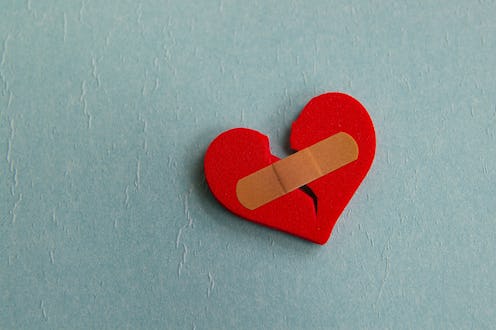Life
Aspirin May Cure Your Broken Heart

Like it or not, the emotional common denominator of humanity is heartbreak. But here’s some good news for anyone who's ever felt the pains of a loss or a breakup (so, everyone): A remedy for your broken heart may be right inside your medicine cabinet.
According to psychologist Walter Mischel, a few aspirin and some healthy distraction may help in mending a saddened heart. His new book The Marshmallow Test is a culmination of his lifelong research in self-control and delayed gratification. Below, a few thoughts from Mischel's book on how physical and emotional pain are linked, and how practicing self-control may in fact be a better remedy for heartbreak than comfort food and bad sappy cinema.
"TAKE TWO ASPIRIN AND CALL ME IN THE MORNING"
In 2011, Mischel’s team presented extraordinary findings about the way we perceive physical and emotional pain. In this study, Mischel and his team showed people who had recently experienced unwanted breakups pictures of their ex-lovers, and in another experiment subjected them to physical pain through thermal stimulation on their forearms.
Using functional MRI equipment, the researchers found that the same areas of the brain were stimulated in both scenarios. "These results give new meaning to the idea that rejection 'hurts,'" says the study. "They demonstrate that rejection and physical pain are similar not only in that they are both distressing —they share a common somatosensory representation as well."
So those timeworn heartache metaphors of physical hurt? Scientifically, they may not be so far off base. Mischel says that the "take two aspirin and call me in the morning" approach, while cold, may actually be a healthy response to a friend bemoaning a freshly broken heart.
FIND A HEALTHY DISTRACTION
In his Stanford Marshmallow Test, Mischel and his team studied the responses in 3- to 5-year-old children who were asked to think about “sad thoughts” and “fun things” while waiting for a marshmallow reward. Thinking “sad thoughts” while waiting for the reward made the delay time while waiting for the treat seem significantly longer. However, when distracted from their end goal of receiving a reward by engaging in other activities, he found, “cognitions about the rewards significantly reduced, rather than enhanced, the length of their delay of gratification.”
Basically, out of sight, out of mind may have some significant sway in piecing yourself back together post-heartbreak.
STOP WALLOWING
Mischel adds that ruminating on the sad or negative experiences associated with heart break, shockingly, don't actually help the healing process. In fact, he says, brooding actually makes matters worse. Each times a person recounts their troublesome experience, he or she becomes further depressed. Objectively self-distancing oneself from the issue, in this case, is the healthiest way to move forward.
In summary: Ditch the wallowing, pop an ibuprofen, and find a new hobby. There are plenty of fish in the sea.